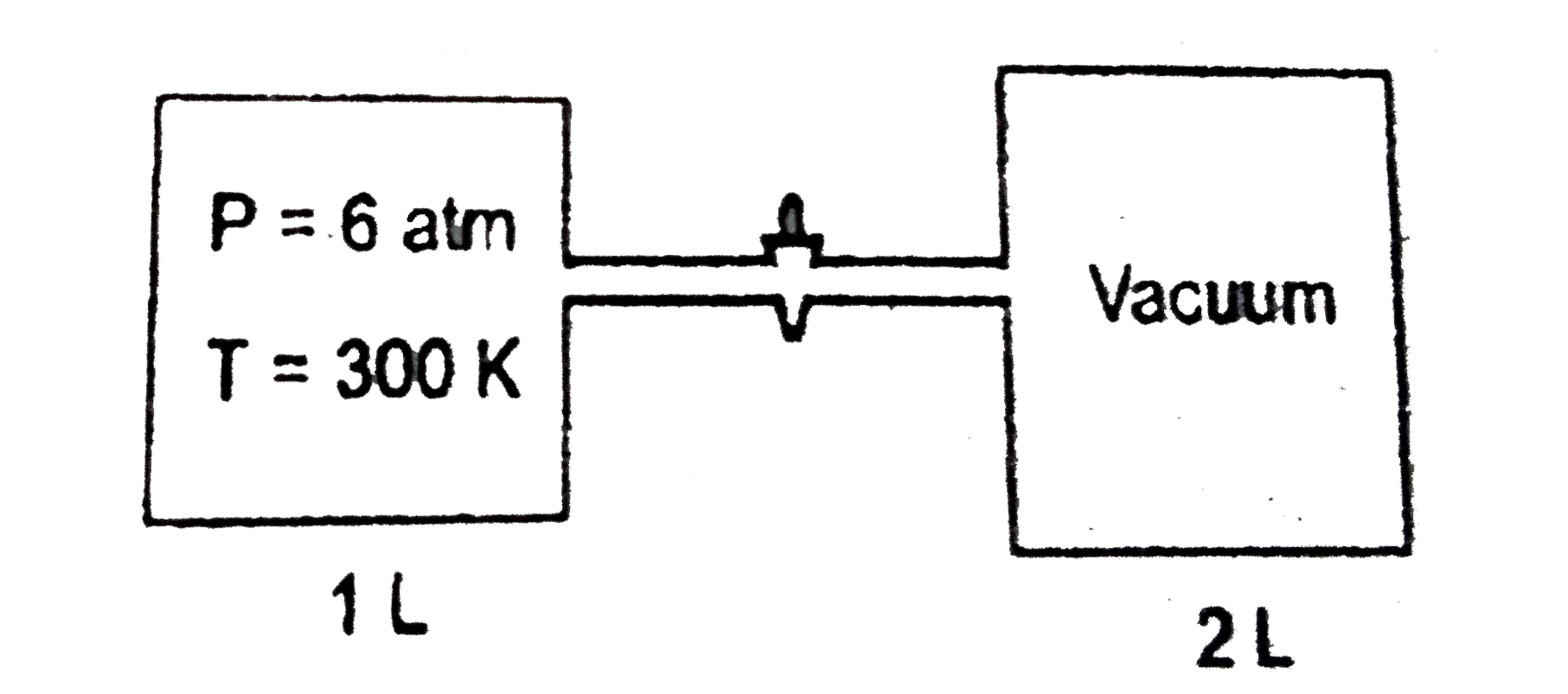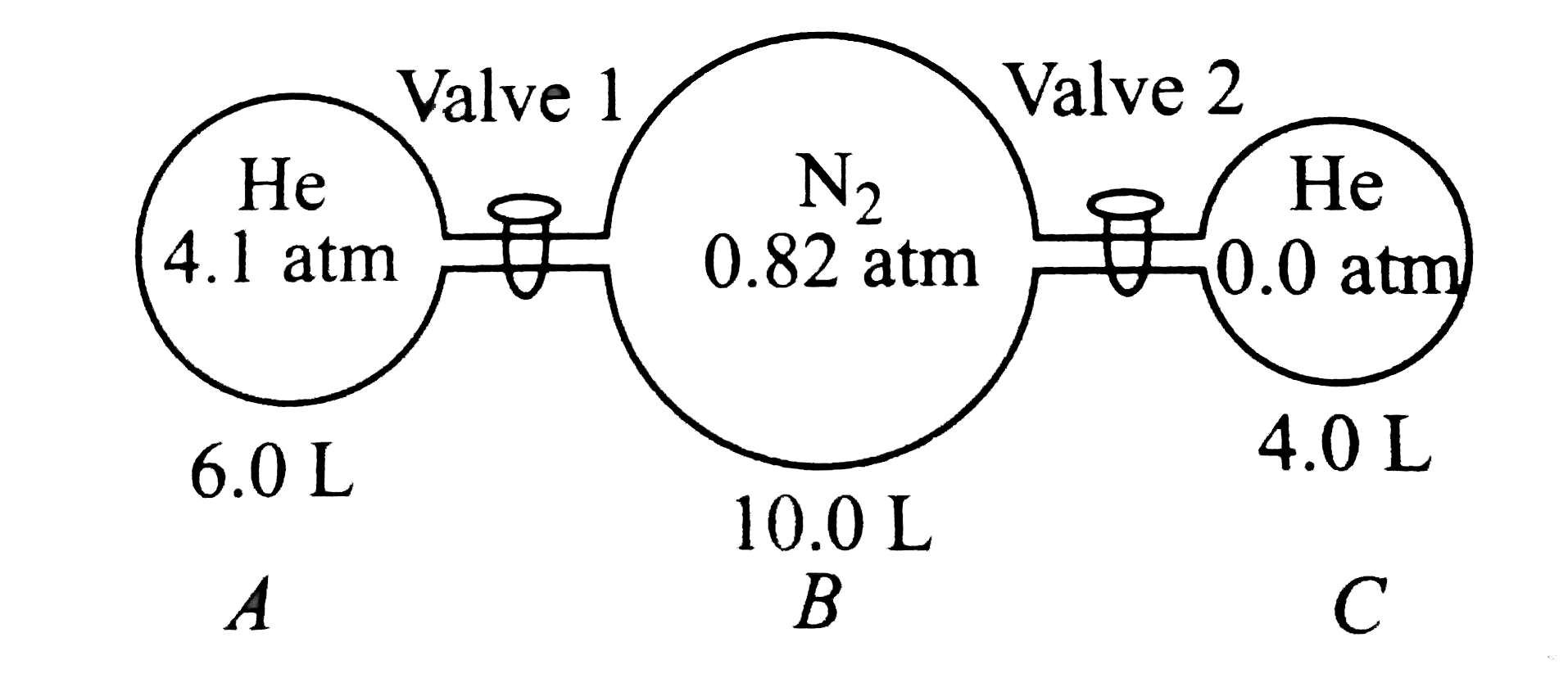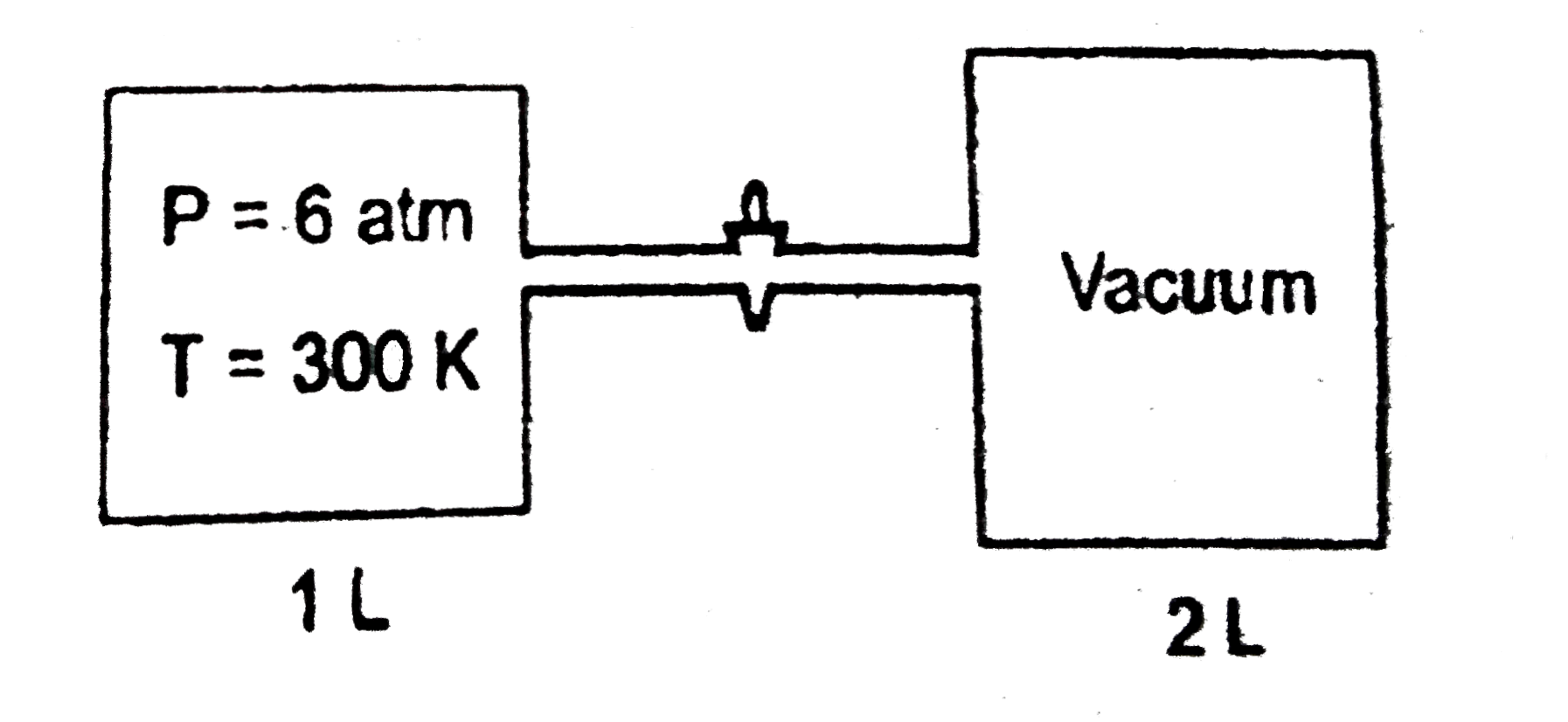It is known fact that gases expand to fill all available volume and their final pressure becomes equal at every point in connected systeam.

If the gas in the above part weigh 15.36g, then select the correct statement(s) :
(R=112l.atm/mol.K)
The gas may be SO2
The gas may be CH4
Moles of gas is 625
Moles of gas is 0.96
The correct Answer is:A, C
Π=6cm,Pf=?
Vi=1L,Vf=3L
T=300,T=300K
ni=6×1R×100,nf=ni
⇒Pf=6×1R×300×R×3003=2atm
ni=6112×300=625
⇒MM=15.36625=2.56×25
=64g/mol
So the gas can be SO2
Topper's Solved these Questions
- TEST PAPERSBook:RESONANCEChapter:TEST PAPERSExercise:PART - III CHEMISTRY
Explore 20 Videos
- TEST PAPERSBook:RESONANCEChapter:TEST PAPERSExercise:PT-03
Explore 1 Video
- TEST PAPERSBook:RESONANCEChapter:TEST PAPERSExercise:PART - III CHEMISTRY SEC - 2
Explore 18 Videos
- SURFACE CHEMISTRYBook:RESONANCEChapter:SURFACE CHEMISTRYExercise:Section - 5
Explore 1 Video
- TEST SERIESBook:RESONANCEChapter:TEST SERIESExercise:CHEMISTRY
Explore 50 Videos
Similar Questions
A vessel of "50L" contains "40g" of an ideal gas "X" at "600K" .The pressure exerted by the gas is 1 atm."20g" of an ideal gas "Y" is added to the same vessel keeping the same temperature.Total pressure becomes "3atm" .If the molar mass of "gas X" is "m (g/mol)" and the molar mass of gas "Y" is "n (g/mol)" then find the value of "(m+n)" .(Use "R=(1)/(12)(atmL)/(molK)" )
View SolutionThe figure given below shows three glass chambers that are connected by valves of negligible volume. At the outset of an experiment, the valves are closed and the chambers contain the gases as detailed in the diagram. All the chambers are at the temperature of 300K and external pressure of 1.0atm.

Which of the following represents the total kinetic energy of all the gas molecules after both valves are opened?
(R=0.082atmLK−1mol−1=8.314JK_1mol−1)
View Solution
Knowledge Check
It is known fact that gases expand to fill all available volume and their final pressure becomes equal at every point in connected systeam.

in the given arrangement, temperature is maintained constant and the knob is opened. After the gas spreads in the second chamber also, the pressure will be:A3 atmB2 atmC6 atmD12 atmOne mole of an ideal monoatomic gas expands isothermally against constant external pressure of 1 atm from initial volume of 1L to a state where its final pressure becomes equal to external pressure. If initial temperature of gas is 300K then total entropy change of system in the above process is:
[R=0.082Latmmol−1K−1≡8.3Jmol−1K−1]A0BRIn(24.6)CRIn(2490)D32RIn(24.6)One mole of an ideal monoatomic gas expands isothermally against constant external pressure of 1atm from intial volume of 1L to a state where its final pressure becomes equal to external pressure. If initial temperature of gas in 300K then total entropy change of system in the above process is:
[R=0.0082Latmmol−1K−1=8.3Jmol−1K−1]A0BRln(24.6)CRln(2490)D3/2Rln(24.6)
In a closed container of volume 10−3m3,O2 gas is filled at temperature 400 K and pressure 1.5 atm. A small hole is made in the container from which gas leaks out to pen atmosphere. After some time the temperature and pressure of container become equals to that of surrounding. Find the mass of gas that leaks out from the container. (Atmospheric temperature = 300 K)
View Solution(a) A certain mass of gas initially at (1L,5atm,300K) is expanded reversible and isothermally to final volume of 5L, calculate the work done by the gas and heat supplied in this process to the gas.
(b) Now, if the gas is released to initial position by compressing it using an external constant pressure of 5 atm. Fins work done on the gas in this process and heat rejected by gas
(c ) In the above two processes, what is the net gained by surroundings ?
[Note: From above question see that surrounding has done extra work on the system but system has returned that work in the form of heat to surrounding and work is considered on organized form of energy while heat as an unorganised form hence in the above process, there must be net increment in randomness of universe which be called Entropy, soon]
View SolutionWhen 1 mole of an ideal gas at 20 atm pressure and 15 L volume expands such that the final pressure becomes 10 atm and the final volume becomes 60 L. Calculate entropy change for the process (Cp.m=30.96Jmole−1K−1)
View SolutionThe second law of thermodynamics is a fundamental law of science. In this problem, we consider the thermodynamics of an ideal gas, phase transition, and chemical equilibrium.
Three moles of CO2 gas expands isothermally (in thermal contact with the surroundings, temperature =15.0∘C) against a fixed external pressure of 1.00¯. The initial and final volumes of the gas are 10.0L and 30.0L, respectively.
Select the correct order of the entropy change.
View SolutionThe second law of thermodynamics is a fundamental law of science. In this problem, we consider the thermodynamics of an ideal gas, phase transition, and chemical equilibrium.
Three moles of CO2 gas expands isothermally (in thermal contact with the surroundings, temperature =15.0∘C) against a fixed external pressure of 1.00¯. The initial and final volumes of the gas are 10.0L and 30.0L, respectively.
Select the correct order of the entropy change.
View Solution

